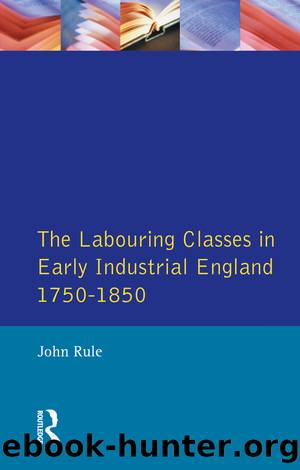The Labouring Classes in Early Industrial England, 1750-1850 by John Rule

Author:John Rule [Rule, John]
Language: eng
Format: epub
Tags: History, Europe, Great Britain, General, Social History
ISBN: 9781317871972
Google: -SasAgAAQBAJ
Publisher: Routledge
Published: 2014-01-21T01:22:03+00:00
Chapter 9
Popular Recreation
Two differing approaches to eighteenth-century leisure put forward by Professor Plumb and by E. P. Thompson can serve as convenient approaches to the subject, although neither was intended as a response to the other. We can also look at a third approach by Hans Medick which seems in some respects to suggest interesting links between the other two. Thompson is concerned specifically with the recreational culture of the lower orders, deliberately labelling a distinctive âplebeian cultureâ. The pastimes of the âplebsâ included those nonliterate ârudeâ sports such as wrestling, cudgelling, football, quoits, bell-ringing, bear- and badger-baiting and cockfighting. Such activities revolved around the agricultural calendar, weekly markets and hiring fairs, or in the case of manufacturing workers were associated with âSt Mondayâ. Thompson presents this culture in the eighteenth century as not only distinctive, but vigorous. Professor Plumb is interested in the commercialisation of leisure, the early development of a leisure industry. This is seen as among the most evident indicators of an eighteenth-century revolution in consumption dependent upon the increase in the number of people having both spare time and some money to indulge recreational pursuits. He is interested in the spread of literature, the arts, theatre and promoted sports like prize fighting and horse racing. All these entertainments involved spending by consumers. He has argued that the late seventeenth and early eighteenth centuries saw a great increase in the provision of such activities as the basis of a leisure culture, which although belonging essentially to the middle class was in the process of downward extension to a significant degree.1
These two views, the one emphasising the perpetuation of the traditional and vulgar, and the other commercialisation, are capable of co-existence to the extent that one describes a predominantly rural-based culture while the other relates mostly to towns. The point of conflict is Plumbâs assertion that the new bourgeois culture was, from the late seventeenth century, driving both the proletarian vulgar culture and that of the patrician elite into small enclaves, for Thompson asserts that for a variety of reasons the traditional pursuits of the people were especially strong and resilient in the eighteenth century. Not until the nineteenth, and then by identifiable forces, were they weakened. His plebeian culture of the eighteenth century encompasses more than simply popular recreational forms, although these play an important and integrated role in his model of a popular culture which represented a whole way of life in which recreations were a necessary part. He finds for the common people of the eighteenth century a âcomparative freedomâ which invigorated popular culture: âThis is the century which sees the erosion of half-free forms of labour, the decline of living-in, the final extinction of labour services and the advance of free, mobile, wage labour.â2 Capitalismâs need for a labour force responsive to the money wage and mobile to follow the needs of the labour market, necessarily meant an interim period in which old forms of control eroded before newer forms of social control and of industrial discipline reformed the basis for hegemony.
Download
This site does not store any files on its server. We only index and link to content provided by other sites. Please contact the content providers to delete copyright contents if any and email us, we'll remove relevant links or contents immediately.
Phoenicians among Others: Why Migrants Mattered in the Ancient Mediterranean by Denise Demetriou(595)
american english file 1 student book 3rd edition by Unknown(589)
Verus Israel: Study of the Relations Between Christians and Jews in the Roman Empire, AD 135-425 by Marcel Simon(585)
Caesar Rules: The Emperor in the Changing Roman World (c. 50 BC â AD 565) by Olivier Hekster(569)
Basic japanese A grammar and workbook by Unknown(553)
Europe, Strategy and Armed Forces by Sven Biscop Jo Coelmont(512)
Give Me Liberty, Seventh Edition by Foner Eric & DuVal Kathleen & McGirr Lisa(491)
Banned in the U.S.A. : A Reference Guide to Book Censorship in Schools and Public Libraries by Herbert N. Foerstel(479)
The Roman World 44 BC-AD 180 by Martin Goodman(469)
Reading Colonial Japan by Mason Michele;Lee Helen;(462)
DS001-THE MAN OF BRONZE by J.R.A(458)
The Dangerous Life and Ideas of Diogenes the Cynic by Jean-Manuel Roubineau(451)
Introducing Christian Ethics by Samuel Wells and Ben Quash with Rebekah Eklund(446)
Imperial Rome AD 193 - 284 by Ando Clifford(445)
The Oxford History of World War II by Richard Overy(444)
Catiline by Henrik Ibsen--Delphi Classics (Illustrated) by Henrik Ibsen(416)
Literary Mathematics by Michael Gavin;(406)
Language Hacking Mandarin by Benny Lewis & Dr. Licheng Gu(400)
Brand by Henrik Ibsen--Delphi Classics (Illustrated) by Henrik Ibsen(377)
